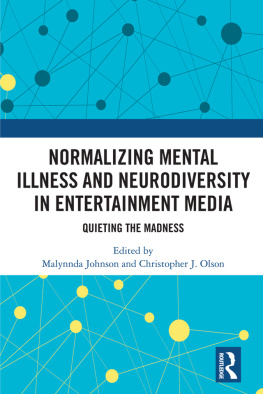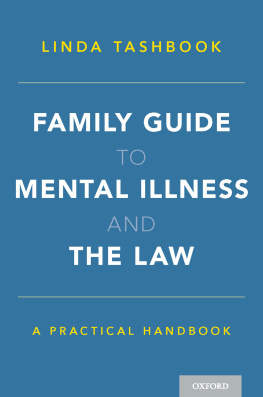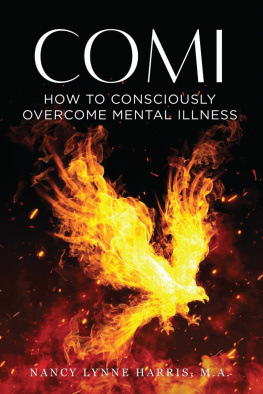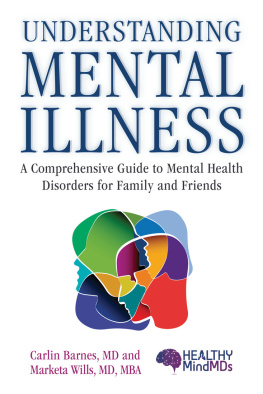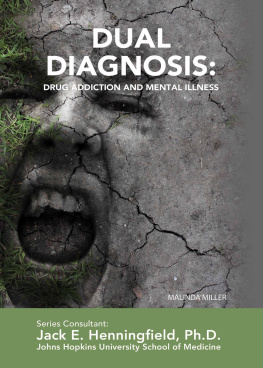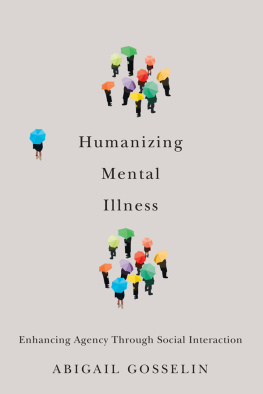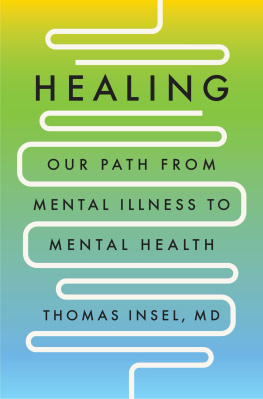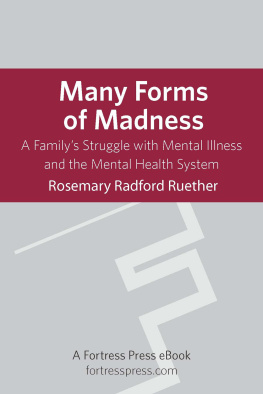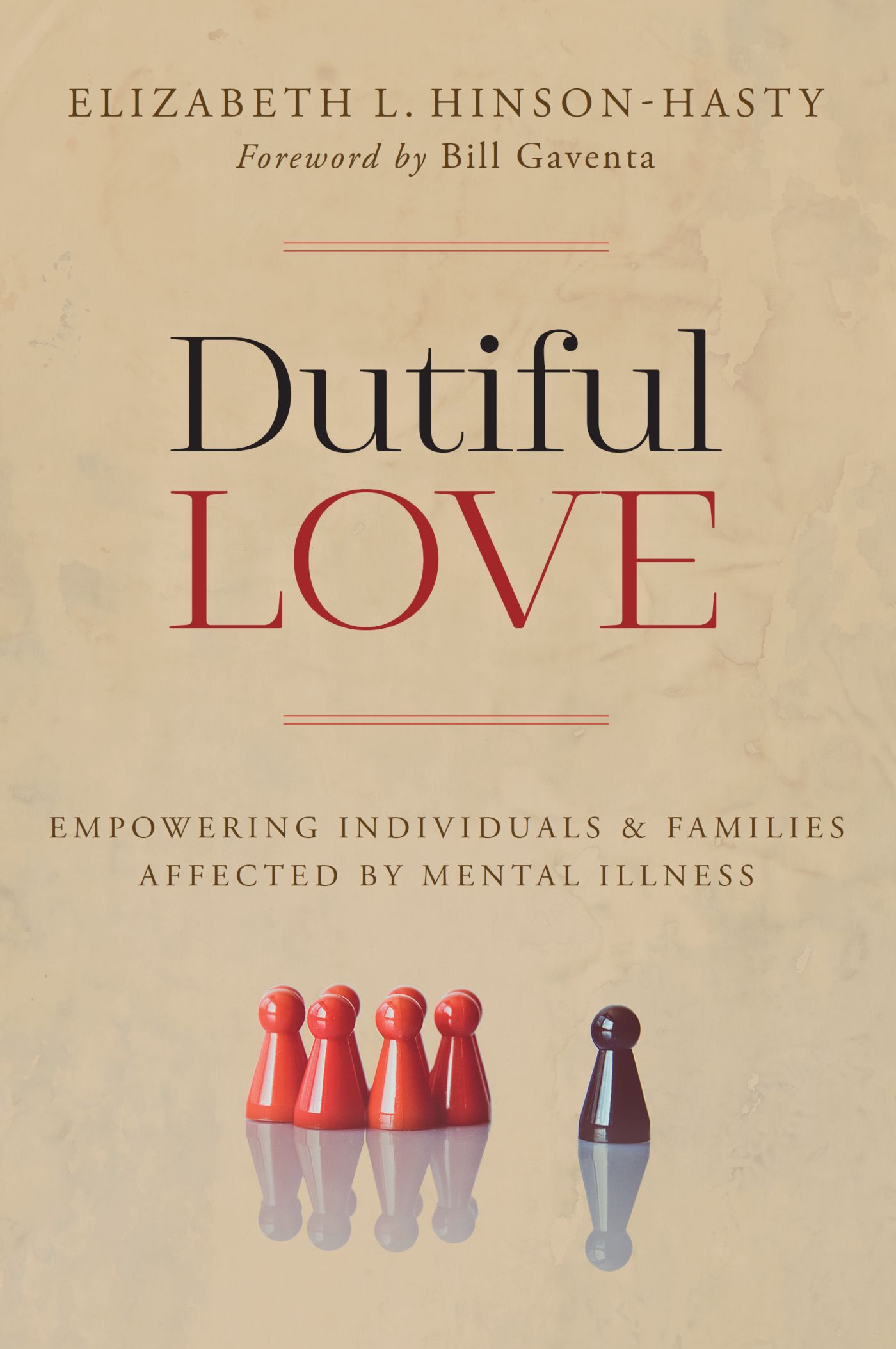
Praise for Dutiful Love
Every so often a scholar writes a book that has the potential to reshape an academic discipline or at least establish an important new research area or subfield. Elizabeth Hinson-Hasty has done that with this breakthrough Christian ethical engagement with the neglected issue of mental illness. This work has all the hallmarks of great Christian social ethicsit tackles a serious human problem involving profound suffering and injustice, attends to the voices of those most affected, diagnoses societal shortfalls that worsen the prbolem unnecessarily, brings serious biblical and theological reflection to bear in order to change our moral vision, and offers examples of a path forward for Christian communities. In the end, this is a book that is about far more than Dutiful Love. It is about the potentially quite joyful transformation of how all of us relate with individuals and families affected by mental illness.
David P. Gushee, Distinguished University Professor of Christian Ethics at Mercer University
A perennial challenge for theologians is to give their work practical import. Elizabeth Hinson-Hasty, a Presbyterian minister and university professor, has written a book that is a superb example of theology that is theoretically and pastorally grounded. She takes her readers beyond thinking about the mere inclusion of persons who suffer from mental illness. She has given us a theology and a blueprint of practices for Christians to adopt in order to give such persons their due, meaning nothing less than their being integral members of their churches and communities.
Ramn Luzrraga, associate professor and chair of the Department of Religious Studies and Theology at St. Martins University
In this perceptive study, Professor Hinson-Hasty recounts the sobering, often sordid, history of social and religious responses to persons with physical and mental disabilities. She then moves beyond that to give voice to individuals and families who confront those realities every day and concludes by calling all of us to nurture and participate in communities of caring, offering creative, insightful ways to do just that.
Candyce C. Leonard, professor emerita, and Bill J. Leonard, professor of divinity emeritus, at Wake Forest University
Elizabeth Hinson-Hasty has done something truly remarkable for the field of Christian ethics in this book. Not only has she conducted rigorous research and provided thoughtful analysis, but she also offers a variety of resources to move her intellectual work into the lived experiences of faith communities. This work fills a gap, one known all too well by those of us like her who have siblings with serious mental health conditions.
Trace Haythorn, executive director of Association for Clinical Pastoral Education
Elizabeth Hinson-Hasty gifts us with a much-needed, groundbreaking liberation theology for mental health disabilities that speaks the unspeakable: how serious mental illness impacts all of us, including not only the person living with serious mental illness but also their loved ones. This book names important truths about the ways our theological traditions, rituals, and practices disempower people with serious mental illness and their loved ones. Hinson-Hasty faithfully uncovers the stigma and shame that overshadow people living with serious mental illness and their loved ones. This book empowers us to create communities of belonging and to advocate for social change for disabilities and mental health justice.
Sarah Lund, minister for Disabilities and Mental Health Justice and author of Blessed Are the Crazy: Breaking the Silence about Mental Illness, Family, and Church
Grounded in the vantage point of siblings of those with severe mental illness, Dutiful Love offers a sweeping and robust account of Western thought about perceptions of illness and examples of both care and mistreatment. By weaving a rich combination of present-day narratives with biblical, theological, cultural, sociological, medical, and economic analysis, Dutiful Love provides a masterful account of Christian responses to mental illness. A theological ethicist, Elizabeth Hinson-Hasty integrates important resources for scholars studying illness, theologians wrestling with suffering, and anyone who cares about how Christian thought and practices shift moral imagination and empower care.
Heather H. Vacek, vice president and dean of Moravian Theological Seminary and author of Madness: America Protestant Responses to Mental Illness
Dutiful Love
Dutiful Love
Empowering Individuals and Families Affected by Mental Illness
Elizabeth L. Hinson-Hasty
Foreword by Bill Gaventa
Fortress Press
Minneapolis
DUTIFUL LOVE
Empowering Individuals and Families Affected by Mental Illness
Copyright 2021 Fortress Press, an imprint of 1517 Media. All rights reserved. Except for brief quotations in critical articles or reviews, no part of this book may be reproduced in any manner without prior written permission from the publisher. Email or write to Permissions, Fortress Press, PO Box 1209, Minneapolis, MN 55440-1209.
Unless otherwise noted, Scripture quotations are from the COMMON ENGLISH BIBLE. Copyright 2011 COMMON ENGLISH BIBLE. All rights reserved. Used by permission (www.CommonEnglishBible.com).
Scripture quotations marked (NRSV) are from New Revised Standard Version Bible, copyright 1989 National Council of the Churches of Christ in the United States of America. Used by permission. All rights reserved worldwide.
Cover design: John M. Lucas
Cover images: Markus Spiske @ Unsplash
Print ISBN: 978-1-5064-6488-6
eBook ISBN: 978-1-5064-6489-3
While the author and 1517 Media have confirmed that all references to website addresses (URLs) were accurate at the time of writing, URLs may have expired or changed since the manuscript was prepared.
Dedicated to Kelly Clark Kunze and Pamela Ruth Prouty
two friends who model inclusion and
nurture communities of belonging
Contents
Brothers and Sisters in the Faith:
People involved in Christian faith communities of many types love to use the language of families. We talk about the family of God, a church family, a church father, a mother of the church, children of God, our extended church family, being welcomed into the family, and belonging to our church family. Some Christian traditions use Brother and Sister as the titles of ordained clergy or members of religious orders. Others also use that terminology for lay leadership in the church such as deacons or others who are simply respected for their longtime relationship with and service to a congregation. At other times, we simply talk about our brothers and sisters in faith. These family metaphors, images, and titles all convey respect for long-term relationships that guide, sustain, and support members of the faith community and one another.
They also speak to our hope and commitment to love one another as a family, but as we all know, both church families and biological families are not always seas of calm for smooth sailing. Storms and rough patches can come from within and without. There are times when individual issues impede the capacity to function as a family unit; other times, the rest of the family have to carry the responsibilities of another to sustain day-to-day life and keep a family together. Sometimes, others are called to take over until a family member is able to pick up their role again. But that is all part of what it means to belong to a family, to be a home that is also sanctuary, where the ties that bind nourish and sustain all of us in the wider world. Both families and churches, we hope, are places where everybody knows our names and we are known wellplaces we can go where they gotta take us in because thats just what we are supposed to do.
Next page

